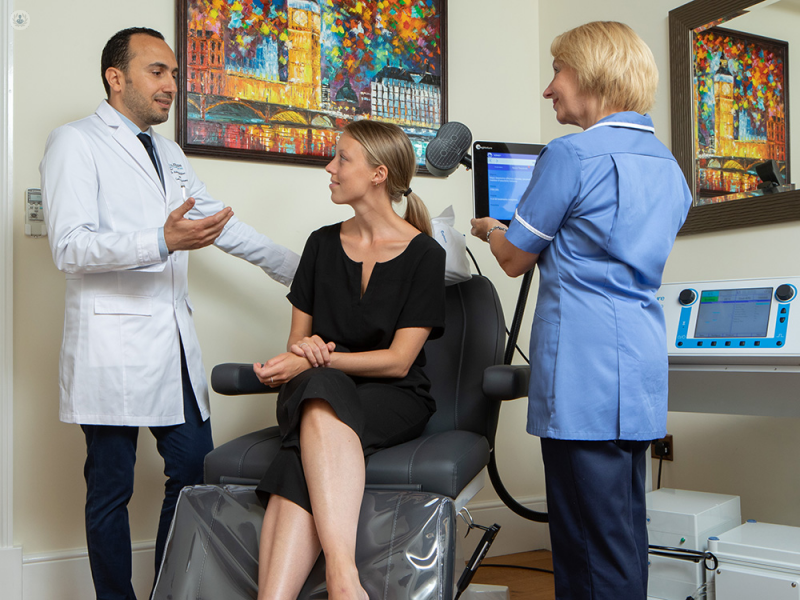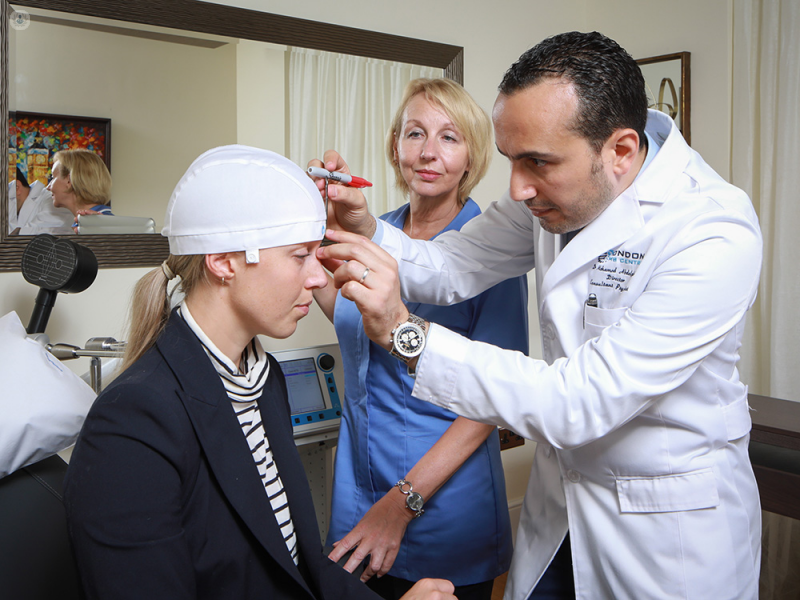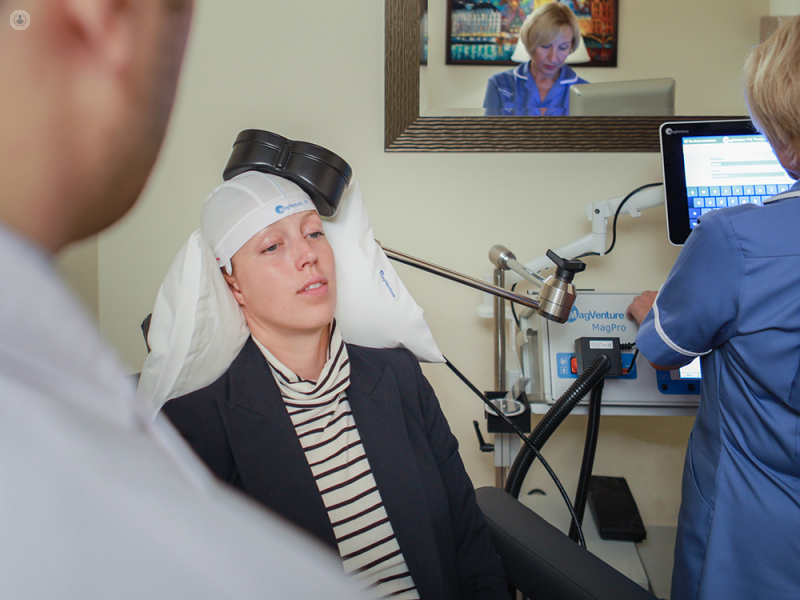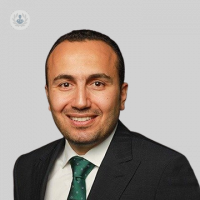Transcranial magnetic stimulation (TMS): what happens during a typical session?
Written by:Transcranial magnetic stimulation (TMS) is a non-invasive procedure that uses magnetic pulses to stimulate the brain to treat certain psychiatric and neurological conditions, in particular depression.
We spoke to Dr Mohamed Abdelghani, an expert consultant psychiatrist and one of the pioneers of introducing TMS to UK clinical practice, to explain a little more about the effectiveness of this treatment, what patients can expect when they go for a session and whether or not there are any side-effects.

What is transcranial magnetic stimulation (TMS) used to treat?
TMS is primarily used to treat depression, however, it can be used for other psychiatric and neurological conditions such as anxiety, OCD, PTSD, some pain conditions, certain types of post-stroke symptoms and occasionally, multiple sclerosis.
TMS is a treatment recommended for depression by NICE (National Institute for Health and Care Excellence) in the UK and several TMS machines are approved by the FDA (Food and Drug Administration) in the USA. While evidence of its efficacy at treating other psychiatric and neurological conditions varies, there is strong evidence to confirm that it is very effective in treating depression.
What typically happens during a session?
TMS is a very personalised treatment that is tailored to each patient. Before the therapy, the patient is assessed by a doctor who decides whether or not this treatment is appropriate. If they agree that it is suitable, a measurement session is then carried out by the treating doctor where dimensions of the patient’s head are taken to locate the most accurate place to apply the magnetic stimulation. We also measure the reactivity of the patient's brain to decide how much stimulation is needed for the treatment of every specific patient.

Once a treatment plan is agreed, the patient can then start coming in for regular daily sessions. Sessions are delivered by a doctor or a highly trained nurse. When the patient arrives, we place a cap on their head, mark out the treatment site and then place an electromagnetic coil on the target area of the head to deliver the stimulation.
TMS is an outpatient clinic procedure and the patient is fully awake and alert during the entire procedure; no sedation or anaesthesia is needed. During the session, they can choose to speak to their nurse or doctor, listen to music or watch a movie or a TV show. The patient will only feel intermittent tapping sensations usually around the front of the head along the hairline. Each session lasts between 3 to 40 minutes, depending on the protocol used, with patients able to resume their usual daily activities straight away after the session.

In our centre, patients get weekly or fortnightly reviews with the treating doctor, who are consultants and experts in the condition that is being treated. These review sessions are used to monitor patients' progress and improvement. To achieve the best TMS results patients must be assessed and treated by a doctor who is an expert in the condition treated.
Is it usually combined with other treatments?
TMS is effective when used on its own, however, if a patient noticed an improvement of their symptoms on other forms of treatment, such as medications, they should stay on that treatment while also undergoing TMS therapy. TMS doesn’t need to be combined with other treatments as it works on its own, but it can be combined if the patient feels they may achieve better results.
How many sessions are needed and how long do results last?
The number of sessions needed depends on the condition that is being treated.
For depression, scientific evidence recommends that patients should receive a total of 20-30 daily sessions. Patients usually receive 5 sessions every week. This means that a typical course of TMS therapy takes 4 to 6 weeks. However, under some circumstances, we can offer patients accelerated TMS which means having more than one session per day. This significantly cuts down the total duration of the treatment.
Many patients will continue to experience the benefits of TMS well over a year after completing their TMS course of treatment. Those who re-experience their symptoms usually do not need to repeat the full course - we can give them booster TMS sessions which can normally be done over a few days.
Does it have any side effects?
TMS is a non-invasive and very safe treatment. Its safety has been documented for more than 20 years; however, any kind of effective treatment may cause some side-effects. That being said, the side-effects of TMS when compared to medication, are minimal. These may include:
- headaches
- discomfort at the site of the stimulation (during the session)
- facial muscle twitches (during the session)
Even if people experience these minor side-effects, in about a week or two they typically start to subside.
It's important to make it clear that TMS is very different from electroconvulsive therapy (ECT), where electric currents are passed through a patient’s brain while they are under general anaesthesia. The mechanism of action of TMS and most importantly the patient experience is extremely different. TMS therapy also does not cause side-effects commonly seen in ECT, such as memory loss and confusion.
TMS is an approved treatment for depression both in the UK and in many other countries. While it is safe and effective, it is associated with a large investment in terms of patient time and cost. However, given how debilitating and costly depression can be the long-term benefits of this treatment are absolutely worth the time and money that will be spent.
If you are interested in TMS, make an appointment with Dr Mohamed Abdelghani by going to his Top Doctors profile and checking his availability.


